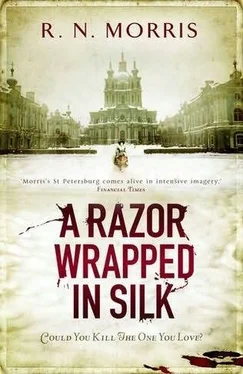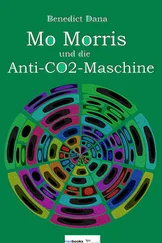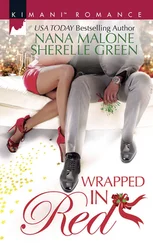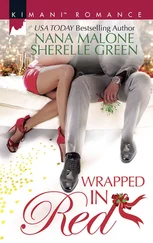R. Morris - A Razor Wrapped in Silk
Здесь есть возможность читать онлайн «R. Morris - A Razor Wrapped in Silk» весь текст электронной книги совершенно бесплатно (целиком полную версию без сокращений). В некоторых случаях можно слушать аудио, скачать через торрент в формате fb2 и присутствует краткое содержание. Жанр: Исторический детектив, на английском языке. Описание произведения, (предисловие) а так же отзывы посетителей доступны на портале библиотеки ЛибКат.
- Название:A Razor Wrapped in Silk
- Автор:
- Жанр:
- Год:неизвестен
- ISBN:нет данных
- Рейтинг книги:5 / 5. Голосов: 1
-
Избранное:Добавить в избранное
- Отзывы:
-
Ваша оценка:
- 100
- 1
- 2
- 3
- 4
- 5
A Razor Wrapped in Silk: краткое содержание, описание и аннотация
Предлагаем к чтению аннотацию, описание, краткое содержание или предисловие (зависит от того, что написал сам автор книги «A Razor Wrapped in Silk»). Если вы не нашли необходимую информацию о книге — напишите в комментариях, мы постараемся отыскать её.
A Razor Wrapped in Silk — читать онлайн бесплатно полную книгу (весь текст) целиком
Ниже представлен текст книги, разбитый по страницам. Система сохранения места последней прочитанной страницы, позволяет с удобством читать онлайн бесплатно книгу «A Razor Wrapped in Silk», без необходимости каждый раз заново искать на чём Вы остановились. Поставьте закладку, и сможете в любой момент перейти на страницу, на которой закончили чтение.
Интервал:
Закладка:
‘It will serve.’
Bakhmutov chortled as if the prince had uttered a great witticism. ‘And the paintings! Did you notice the paintings?’
‘I did. One in particular … a landscape by Robert.’
‘I know the one. It is yours! We will have it packed up and taken round to Naryskin Palace this very day. A small token of our measureless esteem.’
‘A gift? There will be no strings attached?’
‘Merely your signature on the titles we have drawn up.’ Bakhmutov indicated some papers on the boardroom table.
‘It will certainly go well with the three other works by the same artist that I own already.’ But the thought of his Robert collection reminded the prince of less pleasant considerations. ‘What of the outstanding debt I owe to the bank? What will become of that?’
‘Well, once you are director, it could be said to be a debt you owe to yourself,’ said Bakhmutov cheerfully. ‘Which is an interesting position to be in.’
‘Could it not be cancelled?’
‘That is precisely the kind of bold and innovative thinking that we will value once you are signed in as a director,’ said Bakhmutov enthusiastically. More cautiously he added: ‘It is certainly a possibility. However, as I am sure you will understand, it is something that will have to be put to the board. But as the board consists in us, your friends, I can foresee little to prevent you achieving the outcome you desire.’
‘You would do that for me?’
‘Why should we not? For I feel sure that you would do the same for us, your friends.’
‘What do you have in mind?’ asked the prince, suspiciously.
‘In fact, it would be truer to say that you would be doing it for yourself, because as a director of the bank, whatever is in the bank’s interest is in your interest too.’
‘What would you have me do?’
Bakhmutov met Prince Naryskin’s darkly anxious enquiry with a deflective smile. ‘Why discuss it now? This is a celebration. The appropriate time to go into these matters fully will be at the next board meeting. I hope and trust we will have the honour of your attendance.’
Prince Naryskin downed the rest of his champagne. He was not used to drinking in the morning. Something shifted within his perception of the room, a slight swimming of reality. His unease began to lift. He felt the situation simplifying. ‘I could have the Robert? It could be hanging in the palace today?’ Suddenly it seemed as though that was all that mattered.
*
‘And what if he finds out it is a fake?’ demanded von Lembke as he and Bakhmutov crossed the foyer of the bank, having seen a decidedly tipsy Prince Naryskin into his carriage. As the painting in question was being lifted from the wall, Bakhmutov paused to study it with a smile of deep satisfaction. He gave no indication of having heard his partner’s question.
19 The colours of blood
Dr Pervoyedov stood back from the bench, his gaze fixed on the spectroscopic eyepiece attached to his microscope. A curved brass arm clasped a small circular mirror, as though holding it up for examination. It gave the eyepiece an air of raffish inquisitiveness, which was enhanced by a metal kiss-curl at the top of the instrument’s rectangular face. Dr Pervoyedov smiled to himself at the ingenuity of the device. The mirror, and the slit towards which it was directed, allowed a spectrum of natural light to be viewed by the observer alongside the spectrum created by the sample to be inspected, so that any significant discrepancies would be more easily detected.
Outside, the first snow of the season was struggling to distinguish itself in a murky fall of sleet. The natural light in the pathology laboratory of the Obukhovsky Hospital was meagre. To compensate, Dr Pervoyedov had placed a kerosene lamp before a parabolic reflector, to direct light down towards the stage of the microscope.
The material taken from the mirror had dissolved in cold distilled water, which did not rule out its being blood. The scrapings had been brown, consistent with oxidised blood, and the resultant solution had taken on a pale pink colour, the freshness of which again suggested blood. Residues of brown oil-based paint, for example, or dye, would not have reacted in that way. A drop of this solution was now between glass slides held by the frame of the microscope.
Squinting one eye closed, Dr Pervoyedov stooped to place the other against the brass eyepiece. His field of vision was flooded with shimmering strips of colour, contained within an infinite vault of black. There was always something miraculous in the moment when the truth of a theory was revealed in a startling, living experience. White light is made up of all the colours of the spectrum: his mind had always been capable of grasping that fact. But now his soul was bathing in it. He gazed into the vibrant strips of colour, each one both irrefutably bold and tantalisingly insubstantial. The colours existed somewhere he could never reach.
As he adjusted the lens, bringing the bands of colour in and out of focus, he was able to identify the two distinct spectra. The spectrum on the right, cast by the unfiltered light from the mirror, was clear. In the spectrum on the left, two dark bands jumped out at him immediately, one running through the green strip, the other where the green met the yellow. Dr Pervoyedov consulted Chapman’s article in the Lancet of June, 1863. There was a monochrome figure that endeavoured to represent the seven colours of the spectrum. Two thick black lines cut across the diagram, and although they did not look exactly like the soft-edged bands of negation that he had seen, they were in the same relative positions on the spectrum. This was blood. Arterial blood.
Dr Pervoyedov removed the slide from the microscope stage. He then lifted a test tube containing a thin pinkish solution from a rack. He drew off some of the liquid with a pipette and allowed a drop to fall on to a second glass slide.
This time he saw a single, broader, softer beam of darkness, again cutting across the green band, close to the yellow. He finely adjusted the screw that controlled the lens and the single dark strip separated into two distinct absorption lines with a fuzz of green between them.
The pattern corresponded to a second diagram in Chapman’s article. The solution made from the material taken from Yelena Filippovna’s ring was also blood, but venous blood, rather than arterial.
Dr Pervoyedov again looked through the spectroscope eyepiece to confirm his interpretation. He had succeeded in giving Porfiry Petrovich what he expected — exactly what he had expected, he shouldn’t wonder.
*
‘It would have been better, Pavel Pavlovich, if you had brought the man and not the tunic.’ Porfiry Petrovich stood at the window of his chambers, looking out at a bleak, sleet-filled sky. He turned to face Virginsky with a woeful expression. ‘Or better still, the man and the tunic.’
Porfiry lifted his bandaged hand. The dressing was loose and grubby, in places even stained with ink. With his free hand, Porfiry attempted to tighten it, but the cotton strip unravelled in his fumbling fingers. Porfiry shook it loose from his hand, causing a wad of gauze to fall on the floor. He picked this up and examined it. Blowing the dust off, he turned it over and placed it again on his hand. Clasping the end of the bandage with his thumb, he began winding.
Virginsky watched with a mixture of fascination and horror.
Porfiry bound the hand slowly, straining the bandage to keep it taut, and pausing after every turn to check that the dressing was holding its shape. At last he reached the end of the bandage, to which he gave one last sharp tug before folding it under one of the tightly bound edges. As soon as he let go, the dressing returned to its earlier laxity. Porfiry let out a despairing sigh. ‘What were we talking about?’
Читать дальшеИнтервал:
Закладка:
Похожие книги на «A Razor Wrapped in Silk»
Представляем Вашему вниманию похожие книги на «A Razor Wrapped in Silk» списком для выбора. Мы отобрали схожую по названию и смыслу литературу в надежде предоставить читателям больше вариантов отыскать новые, интересные, ещё непрочитанные произведения.
Обсуждение, отзывы о книге «A Razor Wrapped in Silk» и просто собственные мнения читателей. Оставьте ваши комментарии, напишите, что Вы думаете о произведении, его смысле или главных героях. Укажите что конкретно понравилось, а что нет, и почему Вы так считаете.












